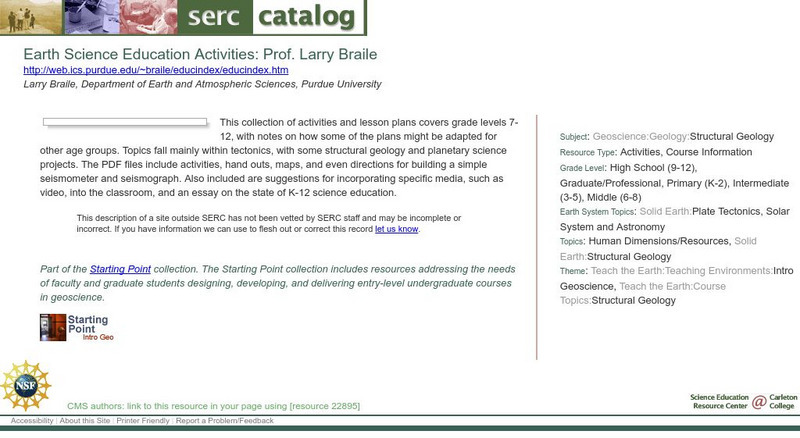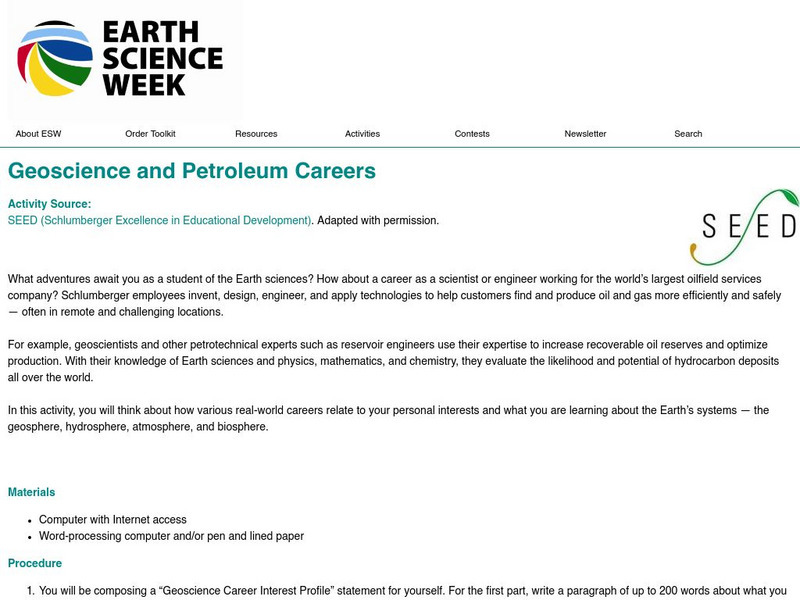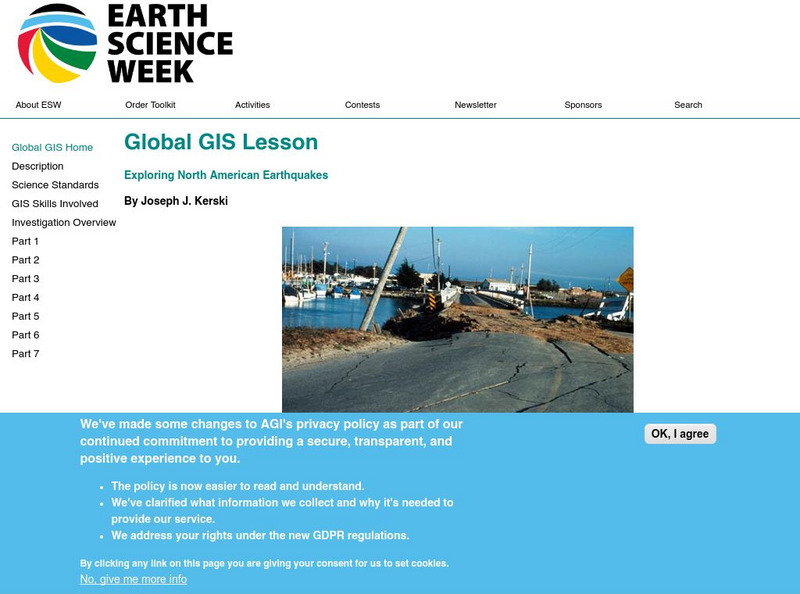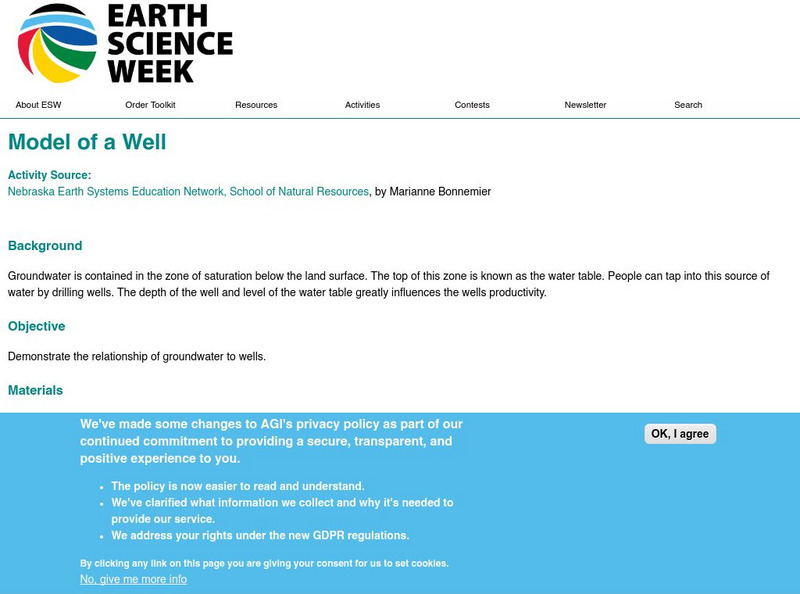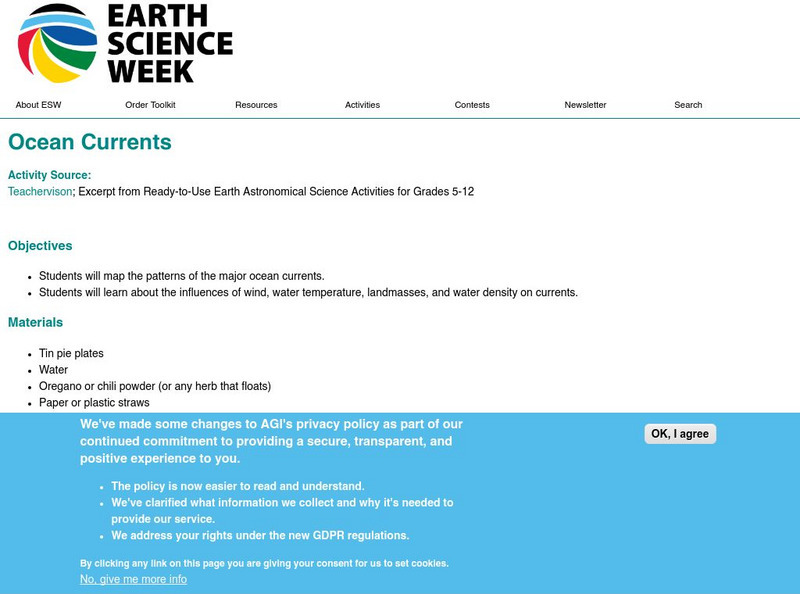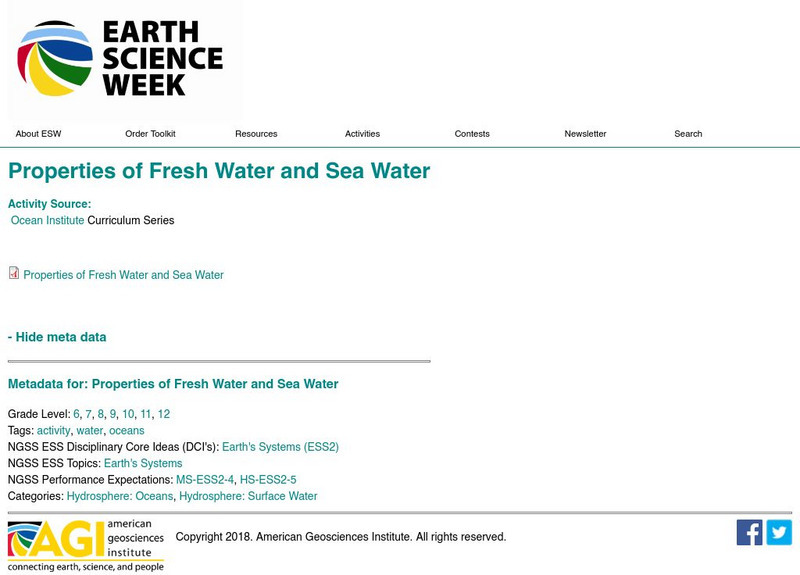Hi, what do you want to do?
PBS
Pbs: Earth Science Exploration
An earth science collection where students can explore earthquakes, volcanoes, and more natural phenomena. The collection uses videos and interactive activities to investigate our dynamic planet and earth systems.
Other
Digital Library for Earth System Education (Dlese)
This resource provides materials for teachers on a huge array of topics. Search site by topic, grade level, and desired output (such as lesson plan, case study, assessment or tutorial). Site is focused on earth science, geography, and...
NASA
Nasa: Mars and Earth: Science Learning Activities for Afterschool
This set of activities teaches students about the big picture of science using Mars as an example: how to collect data, use evidence, and look at models.
Science Education Resource Center at Carleton College
Serc: Earth Science Education Activities: Prof. Larry Braile
A lesson collection covering plate tectonics, with some structural geology and planetary science projects. The PDF files include activities, hand outs, maps, and directions for building a simple seismometer and seismograph. Also included...
American Geosciences Institute
American Geosciences Institute: Earth Science Week: Geoscience and Petroleum Careers
In this activity, students think about how various real-world careers relate to personal interests and Earth's systems- the geosphere, hydrosphere, atmosphere, and biosphere.
Science Education Resource Center at Carleton College
Serc: Sea Ice Extension for the Earth as a System Learning Activity
The purpose of this lesson is for students to learn how the Earth's systems interact on a global level. They will examine global environmental data and compare this to data on the polar regions. In the process, they will develop an...
Texas Commission on Environmental Quality
Tceq: Lesson Plans & Resources for Teaching Environmental Sciences [Pdf]
A large collection of lesson plans on environmental topics. The lessons are broken up into the broad categories of air, water, and waste, and look at issues around quality, pollution, conservation, and recycling. There are activities for...
American Geosciences Institute
American Geosciences Institute: Earth Science Week: Geologic Time Scale Analogy
Introduce learners to the vastness of geologic time and the concept of scale.
American Geosciences Institute
American Geosciences Institute: Earth Science Week: Geologic Maps and Groundwater
This activity is designed to give students practice using a geologic map to understand how water shapes the land- and is stored within the land- in part of the Grand Canyon.
American Geosciences Institute
American Geosciences Institute: Earth Science Week: Geologic Maps & Earthquakes
This activity is designed to give students practice using a geologic map to assess the likelihood and location of a particular natural hazard- earthquakes- in California.
American Geosciences Institute
American Geosciences Institute: Earth Science Week: Global Change: Where Land, Air and Water Meet
To develop an understanding of parts per million as a concept, teams of students create successive dilutions of a solution to reach a parts-per-million concentration.
American Geosciences Institute
American Geosciences Institute: Earth Science Week: Global Gis Lesson: Exploring North American Earthquakes
In this series of lessons, students use Geographic Information Systems (GIS) together with the tools and data from the North America Global GIS CD to investigate earthquakes, volcanoes, and population from a local to global scale....
American Geosciences Institute
American Geosciences Institute: Earth Science Week: Making a Cave
This activity simulates the way that dissolution, a chemical weathering process, leads to the formation of caves.
American Geosciences Institute
American Geosciences Institute: Earth Science Week: Model of a Well
Students demonstrate the relationship of groundwater to wells.
American Geosciences Institute
American Geosciences Institute: Earth Science Week: Ocean Currents
Students map the patterns of the major ocean currents, and learn about the influences of wind, water temperature, landmasses, and water density on currents.
American Geosciences Institute
American Geosciences Institute: Earth Science Week: Sea and Ice Salinity
Students investigate the effects of salinity on the formation of sea ice, and whether salt water freezes more quickly or more slowly than fresh water.
American Geosciences Institute
American Geosciences Institute: Earth Science Week: Sea Level and the Terrapin
Students build a model ecosystem to simulate the life and limiting factors of the Terrapin turtle.
American Geosciences Institute
American Geosciences Institute: Earth Science Week: Sky and Cloud Windows
For this activity, students will conduct experiments or participate in demonstrations to answer questions about sky and weather phenomena.
American Geosciences Institute
American Geosciences Institute: Earth Science Week: Mud Fossils
In this lesson young scholars will look at the major divisions of geologic time and learn about the fossils and forms of life which existed during those periods, helping them to understand how the age of rocks are preserved.
American Geosciences Institute
American Geosciences Institute: Earth Science Week: Gis and Careers
Students learn about GIS technology for solving problems and learn how employers seek workers who know how to make good decisions in a complex world.
American Geosciences Institute
American Geosciences Institute: Earth Science Week: Glacier Slide
Students describe how a glacier carves land and label the characteristics formed by the glacier's movement.
American Geosciences Institute
American Geosciences Institute: Earth Science Week: Houston Activity: Texas Rocks
Using a geologic time scale and map students investigate the rocks in their area.
American Geosciences Institute
American Geosciences Institute: Earth Science Week: Properties of Fresh Water and Sea Water
Students set up three demonstrations to observe the properties of water. They explore the boiling point of water, the freezing point of water, and the ability of water to store heat.
American Geosciences Institute
American Geosciences Institute: Earth Science Week: Getting the Oil Out
Students build an artificial lifting system prototype to test the ability to pump oil.
Other popular searches
- Earth Science Moon Phases
- Branches of Earth Science
- Earth Science Minerals
- Earth Science Inquiry
- Earth Science Lesson
- Earth Science Lesson Plans
- Basic Earth Science
- And Earth Science
- Earth Science Map Reading
- Earth Science and Art
- Earth Science Vocabulary
- Science Earth Layers








